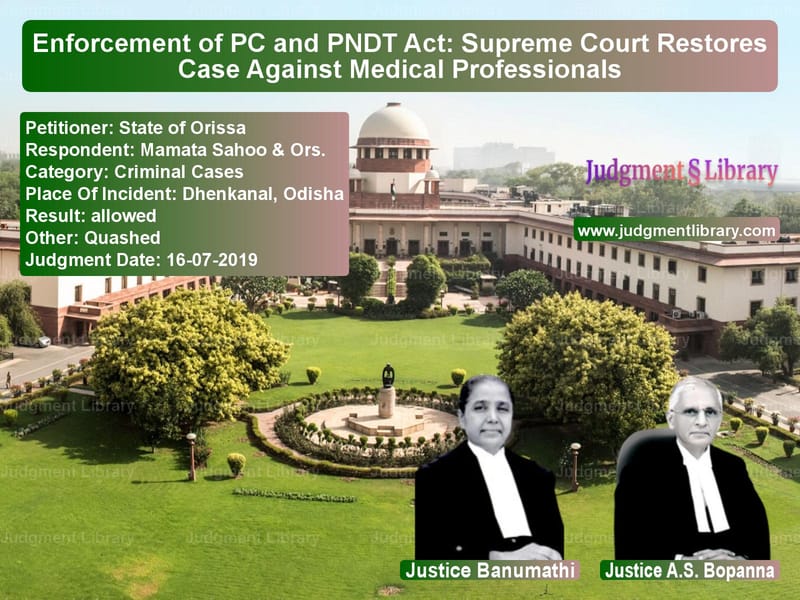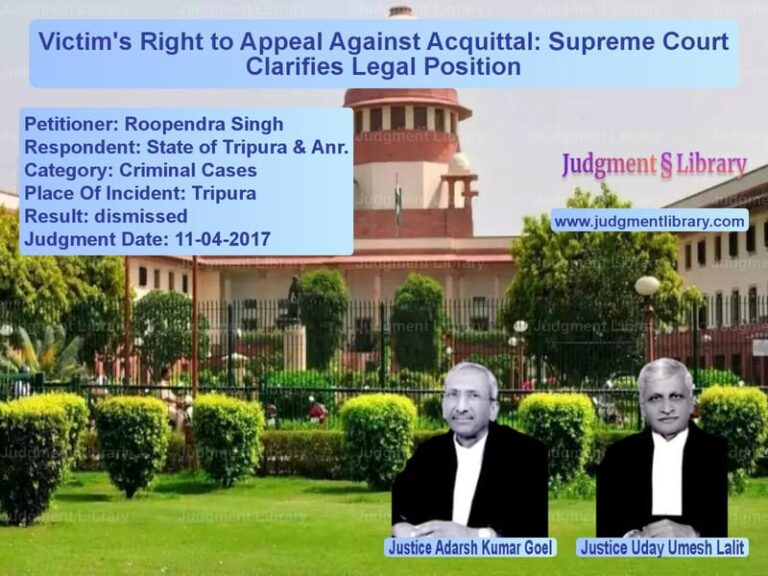Enforcement of PC and PNDT Act: Supreme Court Restores Case Against Medical Professionals
The case of State of Orissa v. Mamata Sahoo & Ors. is a significant ruling on the enforcement of the Pre-Conception and Pre-Natal Diagnostic Techniques (PC and PNDT) Act, 1994, and the role of authorities in monitoring violations. The Supreme Court examined whether the High Court was correct in quashing criminal proceedings against the accused for violations under the PC and PNDT Act.
Background of the Case
On 28 May 2014, a joint inspection was conducted at the Shri Jagannath Hospital by the State and District team, Dhenkanal. The inspection found that the respondents had violated Sections 3(2), 5, and 29 of the PC and PNDT Act, which are punishable under Sections 23 and 25 of the Act. As a result, the authorities seized the ultrasound machine and other equipment from the clinic. The Collector-cum-District Appropriate Authority suspended the registration of the ultrasound clinic on 18 June 2014.
A complaint was filed under Section 28(2) of the Act, and the trial court took cognizance of the offenses and issued summons to the accused. However, the respondents approached the High Court under Section 482 CrPC, seeking to quash the proceedings.
High Court’s Decision
The High Court quashed the complaint on the following grounds:
- The inspection was conducted by the Tehsildar on 28 May 2014 without proper authorization.
- The District Magistrate, being the Appropriate Authority under the PC and PNDT Act, could not delegate its powers.
- The authorization for filing the complaint was issued by the District Magistrate only on 18 June 2014, whereas the inspection had already been conducted on 28 May 2014.
Petitioner’s Arguments
The State of Orissa, represented by its counsel, contended:
- Section 28(1)(a) of the PC and PNDT Act allows complaints to be filed by the Appropriate Authority or any officer authorized by the government.
- The Office Memorandum dated 27 July 2007 explicitly allowed the District Magistrate to nominate an Executive Magistrate to assist in monitoring the Act’s implementation.
- The Tehsildar had been nominated to assist in implementing the Act, and thus, the inspection was valid.
- An order dated 27 May 2014 authorized the Tehsildar to inspect the hospital on 28 May 2014 and take appropriate legal action.
Respondent’s Arguments
The respondents, represented by their counsel, argued:
- The order dated 27 May 2014 was not mentioned in the counter filed before the High Court, raising doubts about its validity.
- The alleged order was not shown to the accused at the time of inspection, making the entire process illegal.
- Since the inspection occurred before official authorization was granted on 18 June 2014, the proceedings were unsustainable.
Supreme Court’s Observations
The Supreme Court examined whether the Tehsildar had the authority to conduct the inspection and whether the High Court was justified in quashing the proceedings.
Key findings of the Court:
- “As per the Office Memorandum, the District Magistrate may nominate an Executive Magistrate to assist in monitoring the implementation of the PC and PNDT Act. This does not amount to an illegal delegation of power.”
- “In the light of the Office Memorandum, it cannot be said that the inspection conducted on 28 May 2014 was without authority.”
- “The High Court failed to consider Order No. 388 dated 27 May 2014, which authorized the Tehsildar to conduct the inspection.”
Since the trial court had already taken cognizance, the Supreme Court held that it was not appropriate for the High Court to interfere at this stage.
Final Judgment
The Supreme Court set aside the High Court’s decision and restored the criminal proceedings against the accused. It directed the trial court to proceed with the matter in accordance with the law.
Conclusion
This ruling underscores the importance of proper enforcement of the PC and PNDT Act. It clarifies the authority of district officials in conducting inspections and ensures that technical objections do not derail criminal proceedings aimed at preventing sex-selective practices.
Petitioner Name: State of Orissa.Respondent Name: Mamata Sahoo & Ors..Judgment By: Justice Banumathi, Justice A.S. Bopanna.Place Of Incident: Dhenkanal, Odisha.Judgment Date: 16-07-2019.
Don’t miss out on the full details! Download the complete judgment in PDF format below and gain valuable insights instantly!
Download Judgment: State of Orissa vs Mamata Sahoo & Ors. Supreme Court of India Judgment Dated 16-07-2019.pdf
Direct Downlaod Judgment: Direct downlaod this Judgment
See all petitions in Medical Malpractice
See all petitions in Legal Malpractice
See all petitions in Judgment by R. Banumathi
See all petitions in Judgment by A. S. Bopanna
See all petitions in allowed
See all petitions in Quashed
See all petitions in supreme court of India judgments July 2019
See all petitions in 2019 judgments
See all posts in Criminal Cases Category
See all allowed petitions in Criminal Cases Category
See all Dismissed petitions in Criminal Cases Category
See all partially allowed petitions in Criminal Cases Category







